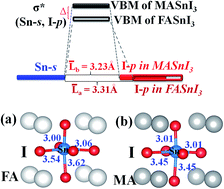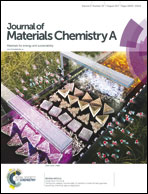Effects of organic cations on the defect physics of tin halide perovskites†
Abstract
Tin (Sn) halide perovskite absorbers have attracted much interest because of their nontoxicity as compared to their lead (Pb) halide perovskite counterparts. Recent progress shows that the power conversion efficiency of FASnI3 (FA = HC(NH2)2) solar cells prevails over that of MASnI3 (MA = CH3NH3). In this paper, we show that the organic cations, i.e., FA and MA, play a vital role in the defect properties of Sn halide perovskites. The antibonding coupling between Sn-5s and I-5p is clearly weaker in FASnI3 than in MASnI3 due to the larger ionic size of FA, leading to higher formation energies of Sn vacancies in FASnI3. Subsequently, the conductivity of FASnI3 can be tuned from p-type to intrinsic by varying the growth conditions of the perovskite semiconductor; in contrast, MASnI3 shows unipolar high p-type conductivity independent of the growth conditions. This provides a reasonable explanation for the better performance of FASnI3-based solar cells in experiments with respect to the MASnI3-based solar cells.



 Please wait while we load your content...
Please wait while we load your content...